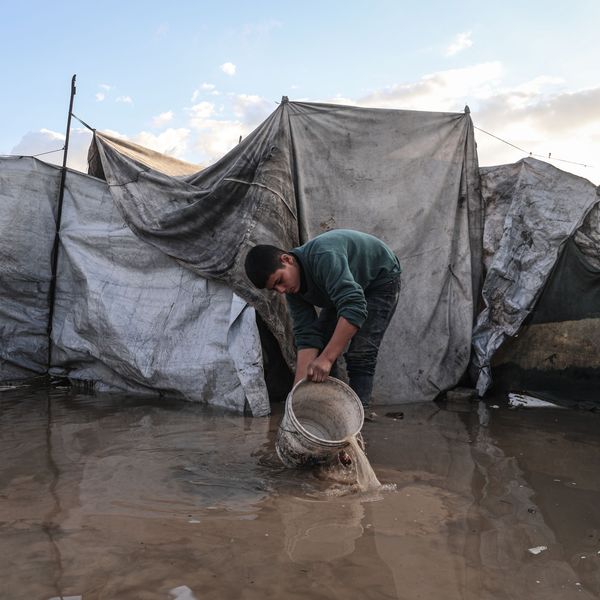Haiti Still Reeling From Disaster Upon Disaster
Hurricane Sandy, the most recent natural disaster to hit Haiti, leaves more homeless
Haiti continues to suffer devastating effects from Hurricane Sandy that hit the Caribbean nation before making its way north.
Though Haiti missed a direct hit from the hurricane, the storm brought heavy rains, and with them an increase in the cases of cholera.
Floodwaters have also brought down homes, blocked roads and destroyed bridges.
"Floodwater had been receding since Sunday but more than 18,000 homes have been flooded, damaged or destroyed," Jens Laerke, spokesperson for the UN Office for the Coordination of Humanitarian Affairs (OCHA) told reporters in Geneva, and added that there are growing fears of a food crisis.
This newest loss of homes will add further misery to the nation that still has over 350,000 people living in tents since the catastrophic earthquake of January 2010.
Haiti Relief and Reconstruction Watch adds: "Newly homeless means more people thrown into a state of vulnerability: vulnerable to cholera and other illness and disease, vulnerable to rape and gender-based violence, vulnerable to hunger, and vulnerable to forced eviction when/if these people move into displaced persons settlements."
At least 50 people died from Hurricane Sandy in Haiti.
An Urgent Message From Our Co-Founder
Dear Common Dreams reader, The U.S. is on a fast track to authoritarianism like nothing I've ever seen. Meanwhile, corporate news outlets are utterly capitulating to Trump, twisting their coverage to avoid drawing his ire while lining up to stuff cash in his pockets. That's why I believe that Common Dreams is doing the best and most consequential reporting that we've ever done. Our small but mighty team is a progressive reporting powerhouse, covering the news every day that the corporate media never will. Our mission has always been simple: To inform. To inspire. And to ignite change for the common good. Now here's the key piece that I want all our readers to understand: None of this would be possible without your financial support. That's not just some fundraising cliche. It's the absolute and literal truth. We don't accept corporate advertising and never will. We don't have a paywall because we don't think people should be blocked from critical news based on their ability to pay. Everything we do is funded by the donations of readers like you. Will you donate now to help power the nonprofit, independent reporting of Common Dreams? Thank you for being a vital member of our community. Together, we can keep independent journalism alive when it’s needed most. - Craig Brown, Co-founder |
Haiti continues to suffer devastating effects from Hurricane Sandy that hit the Caribbean nation before making its way north.
Though Haiti missed a direct hit from the hurricane, the storm brought heavy rains, and with them an increase in the cases of cholera.
Floodwaters have also brought down homes, blocked roads and destroyed bridges.
"Floodwater had been receding since Sunday but more than 18,000 homes have been flooded, damaged or destroyed," Jens Laerke, spokesperson for the UN Office for the Coordination of Humanitarian Affairs (OCHA) told reporters in Geneva, and added that there are growing fears of a food crisis.
This newest loss of homes will add further misery to the nation that still has over 350,000 people living in tents since the catastrophic earthquake of January 2010.
Haiti Relief and Reconstruction Watch adds: "Newly homeless means more people thrown into a state of vulnerability: vulnerable to cholera and other illness and disease, vulnerable to rape and gender-based violence, vulnerable to hunger, and vulnerable to forced eviction when/if these people move into displaced persons settlements."
At least 50 people died from Hurricane Sandy in Haiti.
Haiti continues to suffer devastating effects from Hurricane Sandy that hit the Caribbean nation before making its way north.
Though Haiti missed a direct hit from the hurricane, the storm brought heavy rains, and with them an increase in the cases of cholera.
Floodwaters have also brought down homes, blocked roads and destroyed bridges.
"Floodwater had been receding since Sunday but more than 18,000 homes have been flooded, damaged or destroyed," Jens Laerke, spokesperson for the UN Office for the Coordination of Humanitarian Affairs (OCHA) told reporters in Geneva, and added that there are growing fears of a food crisis.
This newest loss of homes will add further misery to the nation that still has over 350,000 people living in tents since the catastrophic earthquake of January 2010.
Haiti Relief and Reconstruction Watch adds: "Newly homeless means more people thrown into a state of vulnerability: vulnerable to cholera and other illness and disease, vulnerable to rape and gender-based violence, vulnerable to hunger, and vulnerable to forced eviction when/if these people move into displaced persons settlements."
At least 50 people died from Hurricane Sandy in Haiti.

